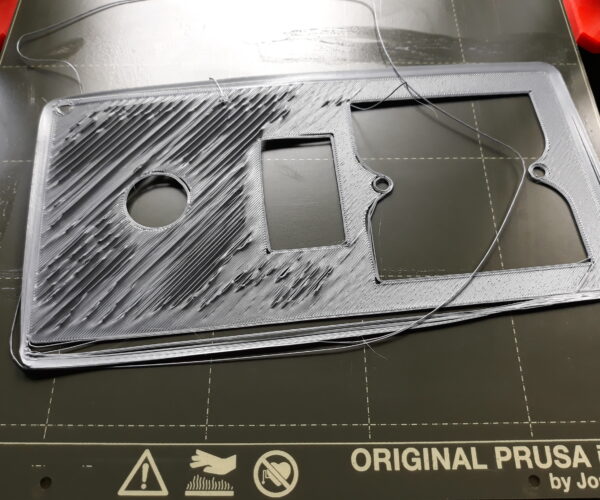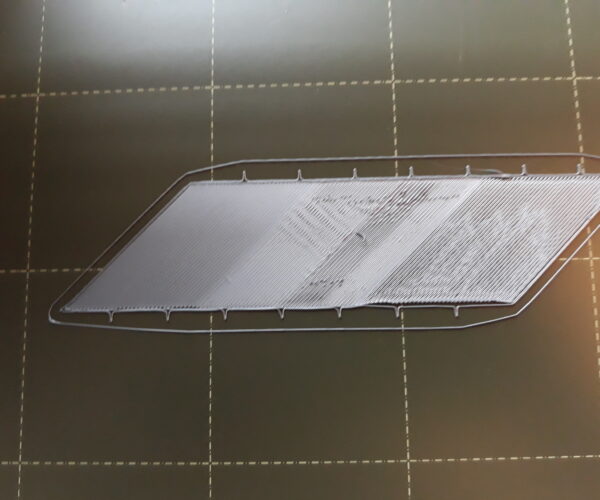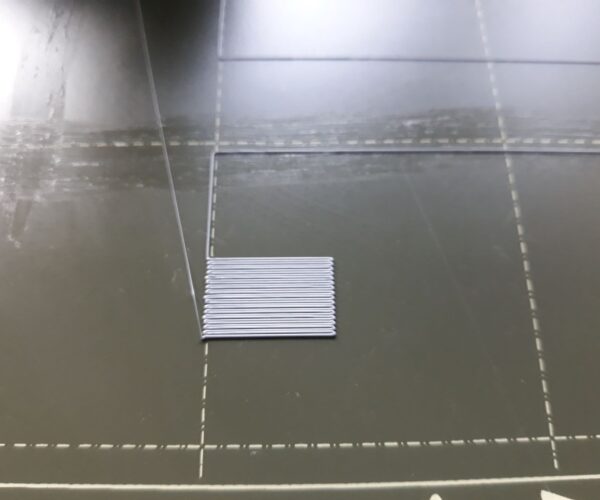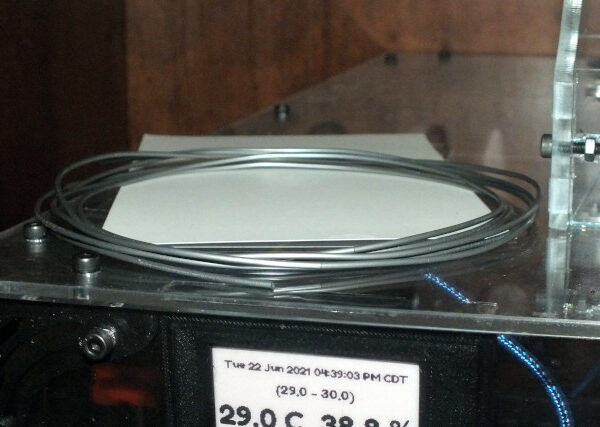Does PLA filament go off with age.
I haven't used my i3 MK3s+ for quite some time and I am having problems getting the first layer to stick to the plate. I have done all the cleaning as recommended without any joy.
I was using a roll of PLA that I purchased with the machine (Aug 2020) which has been bagged and boxed since I last used it, but I notice it has gone very brittle and it is possible to break pieces off. It hasn't been exposed to the elements or UV whilst not on the machine although the bed has been exposed to light through a window.
Does PLA age and go brittle even though bagged and boxed and does anyone have any other suggestion about by first layer issue other than more cleaning
RE: Does PLA filament go off with age.
I would say yes. At least in some cases. I still have a few 5 year old partial rolls of PLA. Stored bagged and out of sunlight so UV is not a factor. Some of them (no name stuff bought from Technology Outlet in the UK) are now brittle and snap easily, often while trying to load them. Other PLA though which is just as old is not brittle and still prints fine.
Try checking all your screws etc are tight still (especially the pinda probe screw). The re doing your first layer live z. If its been sat then you should really do some maintenance anyway, like lubrication etc.
RE: Does PLA filament go off with age.
I certainly go off with age more easily… 🙂
But sure, two years will make PLA brittle. I have some spools of rarely used colors that are even older, and when I take them out of the storage boxes they're in, they tend to be brittle, despite the dehumidifiers in those boxes. It's often just the first few meters of filament sitting on top, and the rest is okay. I also found that for those really old spools drying usually doesn't do much anymore.
Formerly known on this forum as @fuchsr -- https://foxrun3d.com/
RE: Does PLA filament go off with age.
Thank for the quick response.
The filament is Prusa's own so it's somewhat disappointing since it's not the cheapest.
I have done a complete check of the machine including firmware update, nozzle change and re-calibration. A "new" role of filament (same age but unopened until today) is slightly better but far from perfect so it looks like the brittleness may not be a factor and if you both have filament that is 2.5 time the age of mine that would suggest the same.
I'll go back to basics with a new print sheet to see if I get it to work.
Thanks again.
RE: Does PLA filament go off with age.
As usual for this kind of issue, a photo of a first layer calibration would help. Ideally, something like a large calibration square or a strip such as https://www.printables.com/model/105404 as it's easier to interpret in a photo than the tiny square produced by the inbuilt method.
Formerly known on this forum as @fuchsr -- https://foxrun3d.com/
RE: Does PLA filament go off with age.
Thanks. I have included a pic of the part I have been working on. It is a faceplate for a combined power socket/NVR Switch and emergency stop button for my router table. It is on a brand-new plate which has been cleaned with IPA and I used the Pritt stick type glue to see if that would work any better. it was better but as you can see the outside edged came adrift from the plate. The right-hand side then printed reasonably but then it all went wrong on the left-hand side and eventually came detached from the plate altogether. Previously I had printed the gear bearing which stayed on the bed but had a badly deformed first layer 
RE: Does PLA filament go off with age.
Wash the sheet with hot water and fragrant free dish washing soap. Sheets can come from the factory with some coating that the hot water/soap will get rid off.
And again, a picture of the first layer calibration, please.
Formerly known on this forum as @fuchsr -- https://foxrun3d.com/
RE: Does PLA filament go off with age.
Sorry but where is the first layer calibration?
RE: Does PLA filament go off with age.
Found it Doh.
RE:
If you have not done a first layer calibration (aka Live Z adjustment) with a new sheet, I'm not surprised it won't stick. The built in method can be found under the Calibration section of the LCD menu. See https://help.prusa3d.com/article/first-layer-calibration-i3_112364
But I suggest printing something like this https://www.printables.com/model/105404 because it allows you to adjust live z several times in one print.
Formerly known on this forum as @fuchsr -- https://foxrun3d.com/
RE: Does PLA filament go off with age.
I should elaborate that due to manufacturing variances, I would always do a new live z calibration for a new sheet. You can also save live z values for different sheets as "sheet profiles", for easier switching. In the same vein, any change to the hotend or even a simple nozzle swap usually requires adjusting live z.
Formerly known on this forum as @fuchsr -- https://foxrun3d.com/
RE: Does PLA filament go off with age.
Thanks I did do a calibration with the new sheet just as directed from the manual when I first built it I also did it when I change the nozzle on the original sheet and several time since. The live adjustment I have tried but without success. I'll down load the file you linked to and try that now.
RE: Does PLA filament go off with age.
Think I may have it, many thanks to you. I had the z set to -0.015 the RH side of the image below I changed it to -0.40 as per the Prusa help but that didn't look right so backed it off to -0.30 which seems to look right to me, grateful if you could confirm please.
RE: Does PLA filament go off with age.
I've only had one spool that could not be restored with a good baking.
This was a partial spool of the FilamentPM/Prusa(non-ment) that comes as a sample with the printers.
I had forgotten about it and it sat in the corner in room air for over a year.
I gave it two good sessions in the Ninja Cooker on dehydrate, but it still would snap when trying to print.
If you look closely at the image below, you will see hairline cracks.
I still have another partial spool from that same huge honking spool that's been stored in the drybox, and it prints fine, or at least did the last time I used it.
RE: Does PLA filament go off with age.
Thanks, JSW. I don't have any sign of cracking, but it is brittle. Now I have my setting sorted out I'll try it again. My only concern now is that if the filament goes brittle what will the final printed piece do. If it goes the same way, then I may need to look to a different material.
Many thanks to all who responded and helped this rank amateur out of a hole and to better understand some of the intricacies of 3D printing. I feel I have a long way to go so you may see my pleas for help again.
RE:
The very left side of that print looks ok, could possibly go even a tiny bit more lower. btw -0.040 seems like you have the pinda very close to the same level as the nozzle. On most builds the live z value is around -.500 to -1.500 but that's just a general value from using the zip tie to get the spacing. When you start to get wavy lines in the surface as you go lower that is when you know you have gone a bit too far and back it off. While its smooth you can still go lower.
Live z is not an absolute thing and will vary with every printer and will change somewhat if you adjust hardware such as changing a nozzle or if you user a different print sheet.
RE: Does PLA filament go off with age.
Thanks. The LH side is -0.3 and I wound it up a bit from -0.4 which was the band immediately to the right. Whilst printing the first layer on the part I had to raise it up a little further to smooth it out so ended up with -0.275 and the job completed without issue.
I notice Prusa are selling a super pinda which has better tolerance of variation during a long print, have you any experience of this device and is it worth fitting one.
RE: Does PLA filament go off with age.
Normally the last tiny adjustment you are looking at a .005 to .010 change for the final adjustment. Even with different filaments sometimes needing a bit different (say between PLA and PETG which isnt always needed) its the same sort of change. Which is why I'm wondering at your reported -0.400 to -0.275 difference as thats a massive change. Remember that -0.200 is a whole layer at 0.2mm print height.
Also once that first layer is dialled in and printing then you shouldn't need to touch it at all during the print. Live Z is purely for first layer adhesion and getting the filament properly squished on the first layer. No matter what pinda type it has no bearing on the print once that first layer is down.
All the PINDA probes are sensitive to temperature, so different probe temps result in different readings. The old PINDA actually has a thermistor built in that with the right start up gcode can be read. That's the one I have from my original MK3. If you heat up the bed and use it to warm the pinda probe (by locating it 10mm above the bed ) and then delay the mesh levelling until the pinda is at a set temperature as read from its thermistor before you start the mesh levelling you can get absolutely consistent results.
The downside is that on cold days it takes much longer for the probe to come to temp and people get impatient so don't like to wait. Delaying also has the added benefit of the bed can come to thermal equilibrium too and heat more evenly. An extra 5 minutes to get a perfect first layer on a 5 hour plus print is worth it in my book.
Starting successive prints could cause live z difference due to your first print being from 'cold' and the second one from 'hot'.
The Super Pinda actually lost the thermistor, its supposed to be internally compensated better for a temperature range and give out more consistent readings over that range. I don't have one so cant comment personally on how well it does that, except anecdotally from forum posts and a friend who has the MK3s. I don't think it works as well as the old one when you use the delayed method. Unfortunately you can't use that method with the Super Pinda. It probably does work better if you are just probing straight away. I prefer the old one which is why I have a spare in case it ever breaks.
RE: Does PLA filament go off with age.
Thanks Neophyl
I was set at -0.300 to start with. -0.400 was definitely too low so my adjustment was just 0.025 down to -0.275, but I will keep it under review for the next print. Good advice re warming things up first so I'll save my money (or rather spend it on other things) on the super pinda. I have also been thinking about putting the printer in a cabinet, it gathers dust on my desk which is a pain to remove and let's face it they aren't the prettiest things to have as an ornament.

